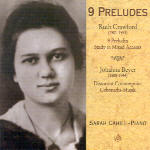The works of Ruth Crawford (Seeger) continue to gain recognition as an important contribution to the evolution of American music in the first half of the 20th century. Her nine Preludes for piano number among her best known and most frequently performed pieces. They are marvelous, and Sarah Cahill clearly relishes them. I’m particularly impressed with her soft playing: the way she captures the atmosphere of the third prelude’s “simplice” marking (and the lively contrast she brings to the atonal pop music of its central episode), or the sixth’s “andante mystico.” And yet she certainly has the chops for Crawford’s virtuoso outbursts: witness her nimble reading of the treacherous Piano Study in Mixed Accents. In short, Crawford’s music demonstrates that a progressive style is no bar to wide ranging musical expression, and Cahill’s performance captures the music’s richness with total success.
Alas, the same cannot be said of the two works by German/American composer Johanna Beyer (1888-1944). A friend of Crawford’s, from whom she reportedly drew inspiration for her own work, Beyer’s music consists largely of directionless atonal noodling with none of her younger friend’s expressive intensity. Still, Cahill plays each piece so beautifully (listen to the depth of tone she conjures for the fifth movement of Dissonant Counterpoint’s low register rumblings) that even if there’s nothing especially involving here, it’s certainly no aural chore. I suspect that Beyer’s presence on this disc stems from the politically correct assertion that the output of neglected female composers must be inherently valuable. Historically interesting? I’ll grant that. Musically interesting? I doubt it.
Still, given the excellence of the Crawford pieces, Cahill’s commanding mastery of the repertoire, and New Albion’s drop-dead gorgeous sonics, this is a very recommendable release on the whole, and I have nothing but admiration for Cahill’s tireless championing of neglected and contemporary music. Thanks to her passionate advocacy, you can at least listen and decide for yourself. [Editor’s Note: Sarah Cahill is an occasional contributor to ClassicsToday.com.]
































